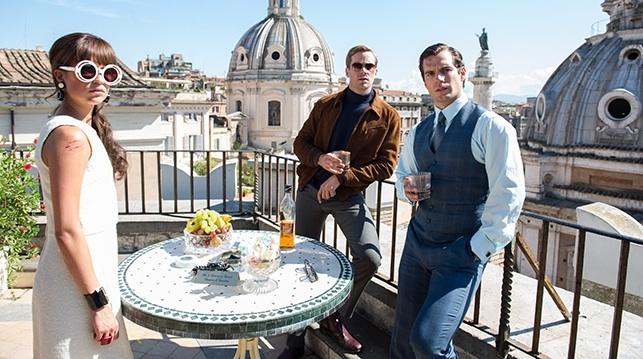The problem with The Man From U.N.C.L.E. is that it brings absolutely nothing new to an already saturated genre. Also, a movie like this lives and dies on the wit of the script and the charm of the actors. This one falls short in both. There is zero chemistry on screen. Whilst Alicia Vikander does her best to inject some humanity into things, she is stymied by the bi-polar script that doesn’t seem to knowwhat it wants from her character.”
The Cold War aesthetic and costume design does add an air of authenticity, giving the film a lived-in feel that helps to immerse the viewer in the setting – but this comes at the expense of originality, and is often undercut by anachronistic dialogue from the pathologically lazy script.
All of the comedy in this odd-spy-couple film, in which Henry Cavill’s CIA agent Napoleon Solo teaming up with his KGB opposite number Ilya Kuryakin (Armie Hammer), is based around the fact that none of the characters care about each other – often totally blasé while watching each other get into mortal peril. It’s funnythe first few times. But it’s hard to get invested in a story where not even the characters in it could give a damn about each other.
Hammer is wasted as the taciturn Russian brute. He should have been the suave and charming American agent. Instead that role was wasted on Cavill who, while believable as a lady’s man, falls desperately short of the all-American pseudo-Bond character he was supposed to inhabit. It’s been a long time since the following claim could have been made, but Hugh Grant is the most charismatic actor in this movie. His short but enjoyable late appearance is a breath of life in a movie that feels like it had already flatlined.
Guy Ritchie has a weird relationship with the action here as well. He orchestrates a thrilling, complex and hilarious chase scene at the start, but turns what should have been the movie’s culminating action set piece into a hasty, no stakes montage at the end – and then follows that up with another protracted chase sequence that doesn’t come close to the wit or ingenuity of the first.
Despite spirited turns from Vikander (as the key to the missing scientist-shaped mystery) and Elizabeth Debicki (as your vampy villainness for the evening), there’s nothing new here, and Ritchie was already trodding on well-worn ground. It could have been saved by some charisma from its leads or some more fun in the script, but there was none to be found. The sequel-baiting ending, though par for the course at this stage, feels laughably cocky. If only The Man From U.N.C.L.E.‘s writers had injected some of that cocksure attitude into their characters, the dialogue or their story.

